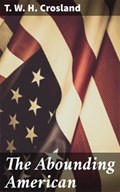In "The Abounding American," T. W. H. Crosland crafts a vibrant narrative that explores the complexities of American life in the early 20th century. Through a series of interconnected stories, Crosland delves into themes of ambition, identity, and societal change, capturing the spirit of a nation at a crossroads. His literary style, marked by a keen observational wit and rich descriptive language, resonates with the work of contemporaries such as Sinclair Lewis and Theodore Dreiser, placing the book within a broader context of American realism that sought to reflect the multifaceted experiences of its populace. Crosland, an English writer and critic, brought his unique perspective to American themes, having lived in various social strata within the United States. His experiences as a journalist and commentator on American culture informed his keen insight into the American psyche. It is this duality of distance and immersion that enabled Crosland to convey a nuanced portrayal of his subjects, ultimately revealing both the grandeur and the pitfalls of the American Dream. Readers seeking a thoughtful examination of early modern America will find "The Abounding American" an invaluable addition to their literary repertoire. Crosland's adept storytelling invites critical reflection on the era's social dynamics, making this work not only an engaging read but also a vital contribution to discussions on identity and aspiration in a rapidly evolving society.

